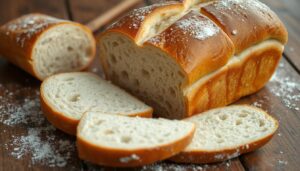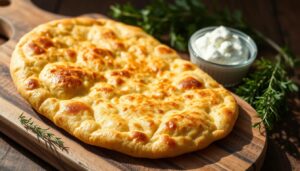Ever wondered why your homemade burger buns don’t match those from fancy burger places? It’s not just about the ingredients. It’s also about the techniques used. We’ll show you how to make the perfect burger bun at home. You’ll see how a homemade bun can be softer, fluffier, and richer than store-bought ones.
Using a brioche base adds a sweet hint and a crispy outside. This will make your burger taste even better. Follow our easy steps and learn the best techniques. Soon, you’ll be making the best burger buns that will wow your family and friends.

You’ll learn about the ingredients, mixing, and baking. We’ll teach you everything to make delicious, artisanal burger buns in your kitchen.
Key Takeaways
- Warm milk is essential for a softer, fluffier bun texture.
- Use bread flour over all-purpose flour for better gluten development.
- Proper kneading and shaping are crucial for optimal rise and appearance.
- Rising times can vary; allow the dough to double in size in a warm place.
- The buns can be baked at 400°F for about 15 minutes for a golden brown finish.
- Frozen homemade buns maintain quality for up to two months.
- A simple recipe allows you to prepare decadently soft homemade burger buns in less than 40 minutes.
Introduction to Homemade Burger Buns
Making your own burger bun is a fun and rewarding task. It turns a simple meal into a memorable one. You get to control the taste and texture, making each bun unique to your liking.
Store-bought buns often fall short, lacking the flavor and texture of homemade ones. With a simple recipe, you can make buns that make your burgers stand out.
Creating your burger buns is quick and easy. It takes about 1 hour from start to finish. You’ll spend 20 minutes mixing, kneading, and shaping the dough. Then, a 30-minute rise lets the dough get ready for baking.
After that, baking the buns takes 15 minutes at 425 degrees Fahrenheit. This is the perfect time to enjoy the amazing smell in your kitchen. If you have leftovers, you can store them in a ziplock bag or freeze them for later.

Why Choose Homemade Burger Buns?
Homemade burger buns take your burger game to the next level. They bring a freshness and flavor that store-bought buns can’t match. By making them yourself, you avoid preservatives and artificial flavors found in pre-made buns.
Homemade buns are great for any diet, making them perfect for parties with different guests. You can choose from whole wheat, gluten-free, or brioche. This lets you create the perfect bun for your taste.
Making your own buns is also rewarding. It connects you to your food, showing the care you put into each batch. Recipes use rich ingredients like whole milk and bread flour, making every bite delicious. Adding an egg wash and sesame seeds makes them look and taste amazing.

There’s nothing like biting into a homemade burger with a freshly baked bun. It’s a joy that gets better with each try. Soon, homemade buns will be a must-have for any meal.
Understanding the Best Burger Bun Ingredients
Making the perfect burger bun starts with the right ingredients. You need to pick the right flour, yeast, and other ingredients. These choices greatly affect the bun’s texture and taste. Let’s explore these key components to make tasty buns at home.
Flours to Use: Bread vs. All-Purpose Flour
The flour you choose is crucial for your buns. Bread flour has more protein than all-purpose flour. This protein makes the dough elastic and strong, perfect for holding toppings.
If you want a softer bun, all-purpose flour works well. It makes a bun that’s lighter but less sturdy.
The Role of Yeast in Burger Bun Recipes
Yeast for burger buns is key for rising. It makes the dough light and fluffy. Instant yeast is great because it acts fast, speeding up the process.
Adding a bit of sugar helps the yeast work better. This leads to buns that are airy and light.
Importance of Eggs and Butter in Enrichment
Eggs and butter make your bun dough richer. Eggs add moisture and flavor, while butter makes it tender. Together, they create buns that taste great and look good too.
If you’re watching your diet, you can use three tablespoons of water instead of eggs. It keeps the bun’s quality without the extra calories.

The Process of Making the Perfect Burger Bun
Making homemade burger buns is a detailed process. It involves mixing, kneading, and rising steps. These steps improve the buns’ texture and taste.
Mixing the Ingredients: Step-by-Step
Begin with warm milk and water at 100°F to 110°F. This temperature activates the yeast. Add sugar to feed the yeast and help the dough rise.
Next, mix in your flour. Bread flour makes the buns strong, but all-purpose flour can make them lighter. Don’t forget a pinch of salt and softened butter to enhance the dough.
Kneading Techniques for Soft Burger Buns
For the softest buns, try the Tangzhong method. It involves cooking flour with water to make a paste. This paste helps the dough hold more moisture, keeping the buns soft.
Knead the dough until it’s smooth and elastic. You can use a stand mixer or knead by hand. After the first rise, punch down the dough. This redistributes the yeast and creates a fine crumb.
Rising Times and Temperature Tips
Let the dough rise in a warm place, around 75°F. This should double its size. Avoid over-proofing, as it can make the buns less puffy but still tasty.
To control the rising time, refrigerate the dough for up to 24 hours. Divide the dough into 90g pieces for consistent buns. Use 10cm bun ring molds for even sizes.

After these steps, your burger buns are ready. You can add sesame seeds for crunch or use whole wheat flour for a nutty flavor.
Learn more about customizable dough recipes.
Shaping Your Burger Buns Like a Pro
Getting the right shape for burger buns is key. Start by letting your dough rest for 1 to 1.5 hours. Then, split it into eight equal parts, each weighing about 135 grams.
Roll each part into a tight ball. This step is crucial for a bun that keeps its shape. Follow these steps carefully:
- Start by cupping your hand over the dough portion and gently pushing it against the work surface.
- Rotate the dough while applying slight pressure to create tension on the surface.
- Use minimal flour to prevent stickiness; excess flour can disturb the dough’s texture.
Place the buns on a baking sheet lined with parchment paper. Make sure they’re about 3 inches apart. Let them rise for 1 to 2 hours, or until they double in size.
After rising, your buns are ready to bake. Proper shaping improves their look and taste. Try different toppings or flours for unique flavors!
Baking Your Burger Buns to Perfection
The baking process is key to making your burger buns special. Start by heating your oven to 425°F (220°C). This temperature cooks them well and makes them golden brown. Before baking, an egg wash adds a nice shine.
Determining When to Take Them Out of the Oven
Getting the timing right is crucial for the perfect buns. Bake for about 25 minutes, turning the pan halfway. Check for these signs to know they’re done:
- Firmness: Press gently on the tops; they should spring back slightly.
- Color: A rich, golden brown hue indicates they are baked properly.
- Sound: Tapping the bottom of a bun should produce a hollow sound, signaling doneness.
After baking, let the buns cool on a wire rack. This keeps them soft. Serve them with your favorite fillings!
| Ingredient | Weight (grams) | Baker’s Percentage |
|---|---|---|
| White Bread Flour | 278 | 60.00% |
| White Whole Wheat | 185 | 40.00% |
| Unsalted European Style Butter | 162 | 35.00% |
| Eggs | 185 | 40.00% |
| Fine White Sugar | 46 | 10.00% |
| Whole Milk | 148 | 32.00% |
| Salt | 10 | 2.30% |
| Ripe Sourdough Starter | 185 | 40.00% |
By following these baking tips, you can greatly improve your burger bun recipe. You can also try making unleavened bread by visiting this link for ideas and techniques.
Types of Burger Buns: Explore Your Options
The bun is key to a great burger. There are many types of buns for different tastes and diets. You can choose from brioche, gluten-free, and vegan buns. Each has its own special qualities to match your burger.
Brioche Burger Buns: A Flavorful Twist
Brioche buns are known for their buttery taste and softness. They add a sweet touch to any burger. Made with eggs and butter, they offer a luxurious feel.
They pair well with beef or veggie patties, making your meal special. Brioche buns have about 293 kcal per 100g, with 8.1g of fat and 9.6g of protein. They’re a filling choice.
Gluten-Free Burger Buns for Dietary Needs
Gluten-free buns are great for those with gluten issues. They’re made with flours like almond or coconut. These buns are denser but still tasty.
Many gluten-free buns have around 250-260 kcal per 100g. They’re a healthy and tasty option.
Vegan Burger Buns: Alternatives to Consider
Vegan buns are perfect for those who prefer plant-based options. They’re made with coconut oil, vegetable milk, and flaxseed. They’re similar in nutrition to regular buns, with about 250-260 kcal per 100g and 8g of protein.
Vegan buns let you enjoy veggie burgers or plant-based versions of classics. They’re a great choice for everyone.
| Type of Burger Bun | Calories (per 100g) | Fat (g) | Protein (g) | Other Nutritional Info |
|---|---|---|---|---|
| Brioche Burger Bun | 293 kcal | 8.1g | 9.6g | High in carbohydrates and fiber |
| Gluten-Free Burger Bun | Approx. 250-260 kcal | Varies | Varies | Uses alternative flours, dense texture |
| Vegan Burger Bun | Approx. 250-260 kcal | Varies | 8g | No animal products, plant-based ingredients |
Creative Burger Bun Variations to Try
Try new burger bun variations to make your meal better. Each one has its own taste and feel. Adding sesame seeds can make your bun crunchier and look better.
These tiny seeds add a nice crunch and look great. You can make your burgers look amazing with a sesame seed bun.
Adding Sesame Seeds for Texture and Appearance
A sesame seed bun is a classic choice. It mixes traditional tastes with a bit of class. The seeds’ nutty flavor goes well with burgers, making each bite better.
This small change makes your burger taste and look better. It’s a great way to make your meal more interesting.
Whole Wheat Burger Buns: Healthier Option
For a healthier choice, try a whole wheat bun. It has more fiber, which helps with digestion and tastes richer. You can enjoy your burgers without feeling guilty.
Whole wheat buns are a nutritious base for your burgers. They work well with many toppings and fillings. Choosing a whole wheat bun makes your meal healthier while still being tasty.
These burger bun variations open up endless possibilities. Try sesame seeds or whole wheat for unique burgers. Experiment with different flavors and textures to find your favorite.
For more snack ideas, check out this guide on making homemade cheese crackers. They’re great with burgers.
Storing and Freezing Your Homemade Burger Buns
To keep your homemade burger buns fresh, it’s important to store them right. Place them in an air-tight container or a sealed plastic bag at room temperature. This keeps their texture and taste good. Don’t let them get too wet, as it can make them soggy and grow bacteria.
Refrigeration can help prevent contamination, but it has downsides. Cold air can dry out your buns, making them stiff and tasteless. They might get stale faster than if you store them at room temperature.
Freezing is the best way to store buns for a long time. Wrapped well, frozen buns stay good for up to a month. Freezing slows down the process of buns getting stale, which is better than refrigeration.
Here’s a simple guide for storing and freezing:
- Store uncut buns at room temperature for up to five days.
- Avoid stacking buns to minimize moisture accumulation.
- Wrap buns tightly in foil or plastic wrap before freezing.
- Use an airtight container for added protection against freezer burn.
- Thaw frozen buns at room temperature or in the microwave, ensuring even reheating.
By following these steps, you can keep your burger buns fresh and ready for your next grilling adventure.
Tips for the Best Burger Buns Every Time
To make the best burger buns, follow some key tips. Timing is important. Try to pick up buns the morning before or the day before. This keeps them fresh and looking great.
Think about how you store your buns. Bags can make them steam and lose shape. Store them without bags to keep their structure. For extra freshness, lightly spray with Scotchgard to prevent moisture.
Make your buns look better with a few tricks. Hollow out the top bun for a snug fit. Use super glue for perfect sesame seed placement.
Baking buns individually helps them stay round and even. Toasting them adds flavor and looks. Toast for about a minute until they’re golden.
Here are ways to store toasted buns:
| Storage Method | Duration |
|---|---|
| Room Temperature | Up to 3 days |
| Refrigerating | Up to 1 week |
| Freezing | Up to 2 months |
For gluten-free buns, use special recipes. For dairy-free, replace butter with oil or mayonnaise. A simple toasting recipe uses 2 tablespoons of butter for 4 buns.
Each toasted bun has about 170 calories, 22g carbs, 4g protein, and 7g fat. Follow these tips to make perfect burger buns every time.
Conclusion
Making your own burger bun can make your burger experience much better. Freshly baked buns add a rich flavor and soft texture. This makes your favorite toppings even more enjoyable.
With a good burger bun recipe, you can make amazing buns. They will impress your family and friends. This guide has given you the tools and ideas you need.
Whether you like the classic style or want to try gluten-free or vegan buns, there’s a recipe for you. Each homemade bun shows off your cooking skills and creativity.
Start this tasty journey by trying new ingredients and flavors. Homemade buns not only taste great but also let you get creative. So, get ready, grab fresh ingredients, and make the best burger buns for every meal.
F.A.Q
What is the best type of flour to use for homemade burger buns?
Bread flour is the top choice for homemade burger buns. It has more protein, which is key for a soft yet sturdy bun. All-purpose flour works too, but the buns might feel a bit different.
Can I make gluten-free burger buns at home?
Absolutely, you can make gluten-free burger buns at home. Use a gluten-free flour mix. Don’t forget to add xanthan gum or psyllium husk for better texture.
How do I ensure my homemade burger buns are fluffy?
For fluffy buns, knead the dough well until it’s smooth and elastic. Then, let it rise in a warm spot until it’s doubled. Follow your recipe’s rising times for the best results.
Are there any vegan options for burger buns?
Yes, making vegan burger buns is easy. Swap eggs for aquafaba, flaxseed, or other egg substitutes. Use plant-based butter or oil instead of regular butter.
What variations can I try for my burger buns?
You can try many variations. Go for whole wheat buns for a healthier choice. Or, make brioche buns for sweetness. You can also top them with sesame seeds for extra texture and looks.
How long do homemade burger buns last?
Homemade buns can stay fresh at room temperature for up to five days. Freeze them for up to two months for longer storage. Keep them in foil or airtight containers to stay fresh.



